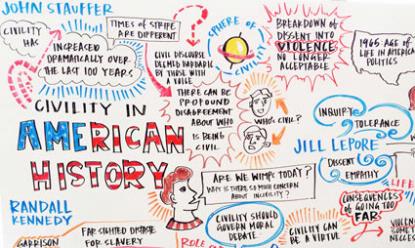
American political discourse seems to be on a path to paralysis. Extremist rhetoric and demagoguery, half-truths and outright lies, and the politics of personal destruction permeate every level of public debate, from Congress to traditional media to the Internet. This lack of civility appears to threaten central features of our democracy and is a cause of increasing alarm among the general public.
According to one recent poll, two-out-of-three Americans consider a general lack of civility to be a major problem for the nation. Nearly half the American people (49%) are tuning out government and politics, and almost two-thirds of those people (63%) cite the general tone and level of civility as a major factor in their decision. Forty-six percent of the people are tuning out opinion pieces and editorials in the media, and 45 percent cite incivility as a major factor. Thirty-eight percent are tuning out news coverage and reporting and half of them (50%) attribute their actions to the lack of civility.
Historians respond that American political discourse has ever been fractious and uncivil, never more so than during the earliest days of the Republic. And at this very moment we are commemorating the sesquicentennial of the most uncivil period in American history – a civil war that lasted four years and cost some 600,000 lives.
The question isn’t whether civility in our public discourse is essential to the survival of our democracy. Clearly it is not. Nor does it matter whether earlier periods in our history were more or less civil than the one we are suffering through now. The crucial question is whether civility is a critical element in the success of our political system. Is it a defining feature of what can — and has — made us unusual? As Judge Learned Hand put it in a famous speech in Central Park at the height of World War II, “the spirit of liberty is the spirit which is not too sure that it is right; the spirit of liberty is the spirit which seeks to understand the minds of other men and women; the spirit of liberty is the spirit which weighs their interests alongside its own without bias.”
President Obama echoed this sentiment in his Notre Dame Commencement speech when he urged his listeners to “temper our passions, and . . . be wary of self-righteousness . . . to remain open, and curious, and eager to continue the moral and spiritual debate . . . within our vast democracy.” The President continued, “This doubt should remind us to persuade through reason, through an appeal whenever we can to universal rather than parochial principles, and most of all through an abiding example of good works, charity, kindness, and service that moves hearts and minds.”
But there is another great tradition in American political and social life that seems to require an abandonment of civility in favor of an even higher good — justice. This is the tradition of dissent, without which, some would argue, progressive reforms from the abolition of slavery to the Civil Rights Act of 1964 to the Goodridge decision legalizing same-sex marriage in Massachusetts could have been achieved. From this perspective, calls for civility can be seen as a puerile, or as a smokescreen for maintaining the status quo.
As the Rev. Martin Luther King, perhaps America’s most revered dissenter, eloquently stated in his Letter from Birmingham Jail, “[W]e must see the need for nonviolent gadflies to create the kind of tension in society that will help men rise from the dark depths of prejudice and racism to the majestic heights of understanding and brotherhood.” Or, in the blunter words of Harvard Law professor Randall Kennedy, “If you are in an argument with a thug (as Dr. King often was), there are things much more important than civility.”
This is true, of course. However we would argue that it is civility that enables a complex, diverse society to tolerate dissent, reconcile conflicts, find common ground, appreciate compromise—all to the end of both keeping the society stable, but also facilitating the ideological, philosophical, ethical, and practical evolution and renewal that keep us vibrant and healthy as a society. Without civility—properly defined, there cannot be rigorous dissent; without civility, there cannot be reconciliation of opposites and profoundly different values; without civility, there cannot be stability, renewal, evolution and change.
On February 17, 2012 the nascent Center for Civil Discourse at UMass Boston launched itself with “Civility and American Democracy: A National Forum.” Co-sponsored by the McCormack Graduate School of Social and Global Policy, Mass Humanities and WBUR-FM, the forum brought a stellar cast of 12 public intellectuals and political observers together before a live audience of more some 500 citizens for a day-long exploration of the meaning, value and practice of civility in American public life. The proceedings of the Forum have been archived for streaming on the CCD website.
On the following day, a smaller group attempted to distill the insights and conclusions from the Forum into a “Civility Charter” that will define the relevance and role of civil discourse in our world today and serve as a guiding document for the ongoing work of the Center for Civil Discourse. The Civility Charter will also ground a series of “Democracy Debates” planned by the Center in the coming months to be broadcast and live streamed on the Internet. The hope of the Center is that a renewed focus on the virtue of civility will help reshape and improve political debates during this crucial election year and beyond. Widespread public involvement in the work of the CCD is welcome and encouraged.
A version of this essay, co-authored by Steve Crosby, Dean of the McCormack Graduate School of Social and Public Policy, was posted on the Boston Globe blog, The Podium, on February 15, 2012.
Photo: “Graphic facilitation” of the Forum provided by Collective Next of Boston.

